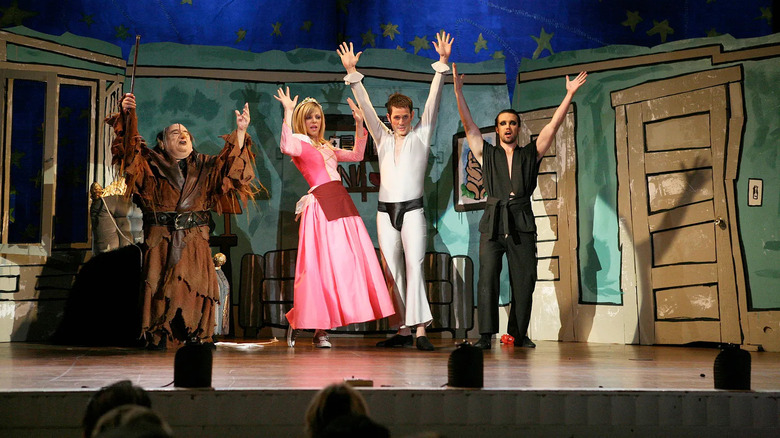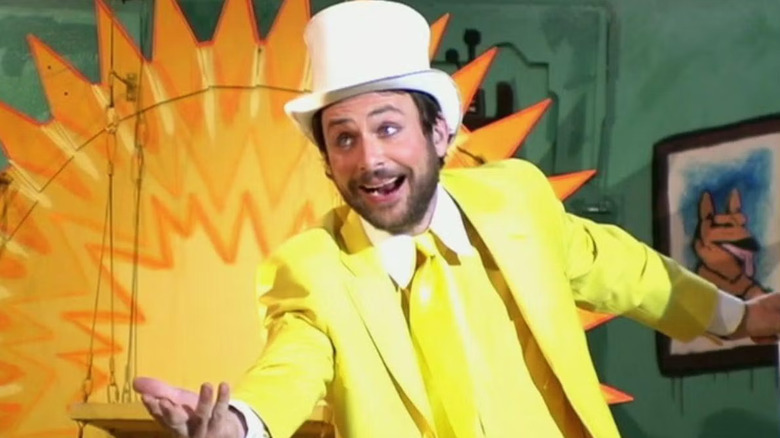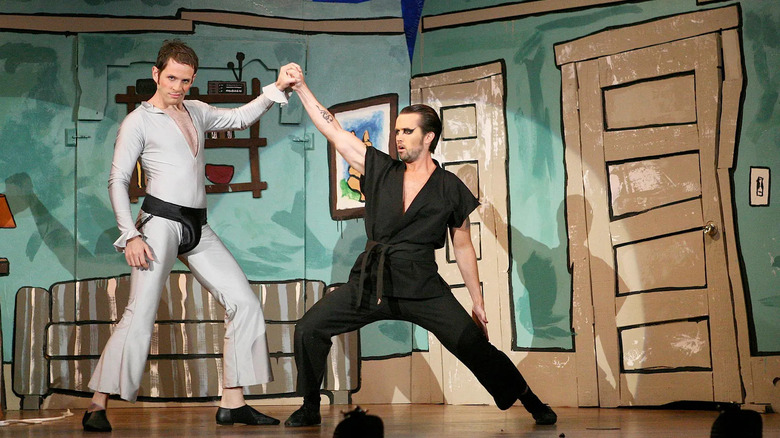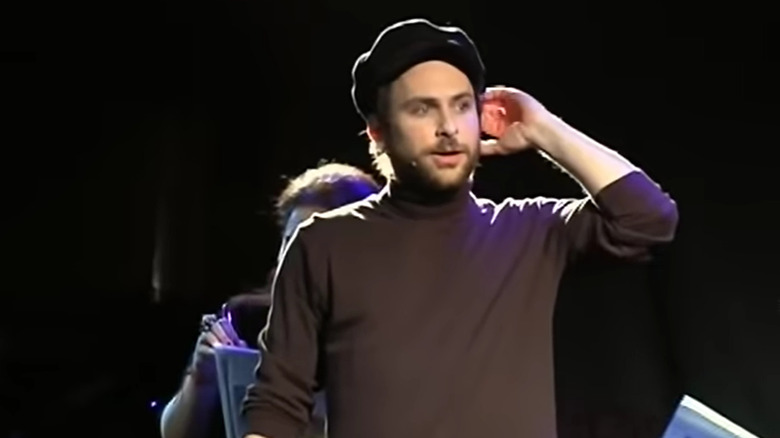Charlie Day Was The Musical Force Behind It's Always Sunny's The Nightman Cometh
"It's Always Sunny in Philadelphia" has a lot of standout episodes, but the season 4 finale, "The Nightman Cometh," is definitely up there. It was not the show's first time dabbling with musical sequences, nor its last, but it's definitely the one people remember most. It's the one where Charlie puts his heart into writing a romantic coming-of-age story to impress his long-term stalkee The Waitress, but instead accidentally writes a musical about a kid getting molested.
Even for the actors themselves, this episode still sticks with them. "I never stopped singing, 'You gotta pay the troll toll to get into that boy's hole,'" Danny DeVito told GQ in a 2018 oral history on the episode. "After that episode, wherever I'd go, people would scream it [at me] out of windows." That line was yet another dark misunderstanding: Charlie wrote the line as "boy's soul," not hole, but the two phrases sound tragically similar, and Frank Reynolds made zero attempts to distinguish the two.
"I spent months waking up in the middle of the night singing 'Tiny Boy, Little Boy,'" said Kaitlyn Olson, referring to an absurdly catchy song Dee and Dennis sing that starts off the musical. Again, Charlie intended it to be sweet, but the pedophilic overtones are so agonizing that Dee feels the need to sing off-script at the end to clarify that she has "never had sex with a child." This is some super dark stuff right here, a continuation of the running gag where Charlie was maybe sorta definitely molested by his Uncle Jack. Most shows couldn't do a joke like this without alienating its audience, but "It's Always Sunny" kept it funny through Charlie's oblivious insistence that the musical is innocent, and the rest of the gang's inability to see it as such.
Charlie Day and Charlie Kelly: Both musically gifted
The episode works because, despite the dark undertones and Charlie's general illiteracy, the music is legitimately good. Although the musical itself would never perform well in the real world, there's clearly a lot of talent and love for musical theater involved. When "Hamilton" creator Lin-Manuel Miranda was on The Always Sunny Podcast last year, he praised the episode for how genuine it was. "What comes across is that Charlie earnestly ... this show came out of him and he's using it — of course for sinister ends — but it doesn't ever feel like you guys are commenting that musicals are bad." As Charlie Day himself put it, "The joke isn't that musicals are bad; the joke is that we're bad at doing them."
As a guy with a musical background of his own, Charlie Day was the driving creative force behind this episode. "I contacted David Hornsby, a writer who plays Rickety Cricket on the show. I got on the piano and plucked out some songs, and we kind of made up what the characters are singing and doing as we went along," Day explained to GQ. "I sent them to [composer] Cormac Bluestone and asked if he could help me do some arrangements for the songs."
Day's inspirations came from his past experience in theatre: "[David] Hornsby and I used to improv this musical about a paper boy," Day explained, "and 'Tiny Boy' was loosely based on a song called like 'Happy Thoughts..." The song was about a paper boy who gets a girlfriend and has "kind of funny thoughts," before the song gets darker and darker. Although the words and context changed for "It's Always Sunny," that same tonal approach — using a happy-sounding tune with increasingly dark lyrics — stuck around for "Tiny Boy."
A coalescing of influences
At the same time though, "Tiny Boy" was also, as Charlie Day put it, "a total [Stephen] Sondheim rip-off." As he played some of the song on the piano during the podcast, Lin-Manuel Miranda explained to the rest of the gang what made the music sound so much like Sondheim: "Sondheim would never use like a major chord when he could do like a weird seventh chord or a second or a fourth."
Throughout the episode, Day keeps mentioning Sondheim, and his musical "Into the Woods" in particular, as a major influence for him. "Do you remember the Bravo channel?" he says to the gang. "Before it was all these reality shows, they would play plays, and they had 'Into the Woods' on there a lot ... I would get home after like, hanging out with my buddies, and I'd make myself like a gin and tonic and I would watch 'Into the Woods.' ... I was like, 'God, this is so good. I didn't think I liked this before and I really like it now.'"
Another famous moment in the episode, where Charlie goes full "theater tyrant" and starts screaming at Dee, was also based on the actors' experience with theater growing up. Not only does Charlie love plays, but Juilliard alumni Glenn Howerton had plenty of theatre experience as well. "Well, I think that's just a funny concept," Day said. "That's a dynamic that happens in the theater. Like I'm sure, Glenn, you've seen it like in the Julliard days where it's just like this extreme tension about this ridiculous thing that people are doing. But also also underneath it, [Charlie]'s trying to get this girl to marry him, and he's got everything riding on it, you know what I mean?"
Making an actual play
Another unique aspect of "The Nightman Cometh" is how it was filmed. The scenes of the play itself were all done as an actual play with a real audience, while all the behind-the-curtain drama was filmed separately. "I wanted it to exist as a full theater piece," said the episode's director, Matt Shakman. "So I brought in 100 background performers who had no idea what they were about to watch and told the guys, 'Just do it all the way through.'"
"The audience didn't have any context, so I remember a lot of confused faces as we were performing," Rob McElhenny added. "People [who weren't familiar with the show] were wondering why it was funny ... But I always go back to Glenn and Charlie; if they're still laughing, then I know it's funny."
The episode was such a hit that in 2009, the cast did a live performance of the episode in multiple cities across the country. This time around, the audience was fully on board, singing along and cheering on the actors as they delivered their many now-iconic lines. The best part was Charlie's proposal song at the end, where he one-ups his performance from the episode by throwing in a random, perfectly-delivered harmonica solo. Day described the experience as an "adrenaline rush," and a highlight of his career.
"When you're making television, aside from someone coming up to you at the airport or something, you don't really know the impact of your show. You never have a large crowd of people screaming or singing along," Day explained. "It was a glimpse into what it was like to be a rock star for a minute, to have people singing your songs, and a really raucous crowd interacting with us."



